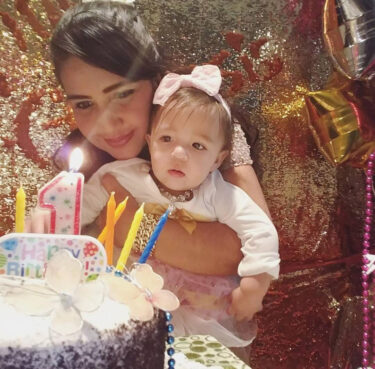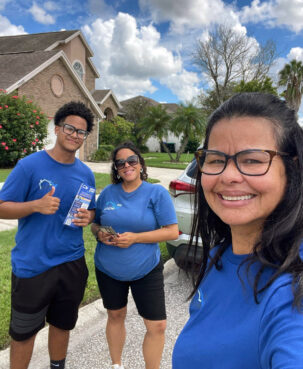(RNS) — Since the Supreme Court returned the question of abortion to the states in 2022, voters have consistently sided with abortion rights. In every state where abortion measures have been put on ballots, abortion rights have come out on top. But that may change in Florida next week.
Abortion is on the ballot in 10 states this election, but Florida is seen as anti-abortion groups’ best chance to notch a win, as they need to convince just slightly more than 2 in 5 Florida voters to vote no on Amendment 4, a ballot initiative that would constitutionalize Floridians’ right to abortion before viability. Florida currently has a ban on abortion after six weeks — a restriction, passed by the Florida Legislature and signed by Gov. Ron DeSantis, that in May 2024 replaced a previous 15-week ban. Because the ballot measure is an amendment to the state’s constitution, Amendment 4 requires a 60% support threshold in order to pass.
The stakes are high for both abortion rights and anti-abortion groups as they fight for and against the amendment. If Florida were to open up abortion rights, it would be the only abortion access point in the southeastern United States, as all the states bordering Florida — and the states bordering those states — have abortion bans or restrictions on abortion earlier in pregnancy than Roe v. Wade had. If Florida maintains its abortion ban, one of the strictest in the country, it would offer a first voter victory against abortion. And, according to some anti-abortion advocates, it could offer an example of a six-week ban with more popular support because of its exceptions for rape, incest, human trafficking, life of the pregnant person, as well as serious irreversible health impacts to the pregnant person and fatal fetal abnormalities.
Religious groups and people of faith have been at the forefront on both sides — advocating for and against the amendment.
Catholic bishops, though they have spent less money in Florida than on some of the 2022 state abortion ballot measures, are still one of the largest anti-abortion donors in the state, while clergy members from five other faiths have argued that the abortion ban violates their religious freedom. Catholics for Choice and the Religious Action Center of Reform Judaism have been actively working to mobilize voters in support of the amendment.
With Latinos making up more than a quarter of Florida’s population — and most of them identifying as either Catholic or evangelical, two groups with staunchly anti-abortion doctrine — they have become a key constituency for both sides and are expected to play a crucial role in deciding one of Tuesday’s most contentious races beyond the presidential election.
RNS spoke with three Latina Floridians who said their faith has guided them as they work to engage their communities to vote for or against the amendment.
When Luz Alvarado thinks about Amendment 4, the abortion rights measure, she thinks about her daughter, Génesis Alba.
Alvarado became pregnant with Génesis after finishing breast cancer treatment. The mother of two had just lost a pregnancy in her third trimester while undergoing that treatment, and her doctor told her it was not wise to have another pregnancy so soon and advised her to get an abortion.
The lifelong Colombian Catholic ended up in one of the Archdiocese of Miami’s pregnancy help centers, not realizing the center was anti-abortion.

Luz Alvarado celebrates the first birthday of her daughter, Génesis Alba. (Photo courtesy of Luz Alvarado)
“We got the place wrong, but we ended up in the right place,” Alvarado told RNS in Spanish.
The center sent her to get a second opinion from another doctor, who told her and her husband she could proceed with her pregnancy, as well as helped her with medical costs.
Génesis was healthy, and eight years later, Alvarado’s cancer has not returned.
Since her third month of her pregnancy with Génesis, Alvarado has regularly volunteered with the Respect Life center. She sees abortion as an error that humans make because of a “lack of knowledge” and believes pregnancy crisis centers can provide that knowledge, as well as concrete resources.
When pregnant women hear their fetus’s heartbeat, “bad decisions become good decisions,” Alvarado said. “A baby’s heartbeat is the most heavenly sound you can hear,” she said. “I say it’s the voice of God.”
As the election approaches, Alvarado believes the best way to combat Amendment 4 is to share stories like hers, which she has done through the Archdiocese of Miami and within small groups.
As for the Catholics who are supporting the amendment, Alvarado doesn’t see them as truly Catholic. “They have not known the Word of God well,” she said.
But across several opinion polls, a majority of U.S. Latino Catholics support abortion being legal in most or all cases, ranging from 6 to 7 in 10 Latino Catholics. These opinions stand in contrast to teaching from Catholic bishops, who have instructed Catholic voters that the “threat of abortion” should be their “preeminent priority” when voting.
Before she wrote an op-ed in the Miami Herald supporting Amendment 4, Olga Granda told RNS that “people probably knew me as a quote unquote pro-lifer,” having worked because of her Catholic faith against the death penalty and for the “health and lives of women and babies.”
In her article in the Miami Herald, Granda wrote that, as a practicing Catholic, her opinion on abortion began to shift as she saw friends go through difficult pregnancies, including a friend who nearly lost her life carrying a baby medical professionals knew would not survive.
Still, it wasn’t until she began to hear about the impacts of new anti-abortion laws after the Supreme Court’s Dobbs decision, and particularly Florida’s six-week ban, that Granda was motivated to publicly take a stand.
Granda told RNS that as she heard more stories of women experiencing negative health outcomes due to abortion restrictions, she felt “this is getting out of hand.” She asked herself, “Is that really what the church wants? Are we trying to force people to be in positions in which their lives are in danger and they don’t have access to the health care that they need?”
So at the invitation of a friend and mentor, Granda joined forces with Catholics for Choice, a national nonprofit organization advocating for abortion rights from a Catholic social justice lens, and “started to learn how you could reconcile being Catholic and advocating for reproductive freedom.”
Beyond her op-ed, Granda has organized house meetings to speak with her community, especially other Latino Catholics, about the importance of the amendment.
The Cuban-American business owner and mother said she shies away from “hands off my body language,” saying families, medical professionals and even sometimes spiritual leaders should be involved in those decisions. She emphasized, “It should not be something that is dictated by politicians.”
“Does that mean that I’m encouraging people to have abortions?” Granda asked. “Of course, the answer is no.”
Lucy Rodríguez, Florida state director for voter engagement organization Mi Vecino, has handed out Catholics for Choice pamphlets as her organization goes door-to-door advocating for Amendment 4.
But Rodríguez herself is not Catholic, instead coming from an evangelical Christian family full of “pastors and great leaders of the Christian church.” The organizer, who said, as a mother hen, she treats her team like her children, told RNS in Spanish that her faith is strong because “I have seen many miracles.”

Lucy Rodríguez, right, canvasses with colleagues from the Mi Vecino organization in Florida. (Photo courtesy of Lucy Rodríguez)
Rodríguez attends Centro Cristiano El Pan De Vida, or the Christian Center The Bread of Life, in Kissimmee, part of the Pentecostal Church of God of Prophecy denomination.
While she hasn’t heard anything about abortion from the pulpit recently, when it is preached about, “they say it’s a sin,” Rodríguez said.
“That’s why I tell you I’m a conservative on the issue,” Rodríguez said, adding it’s also something she tells voters. “But I’m not in agreement with the government coming to your house,” she said. “It’s an issue the government should not get involved in.”
Having immigrated from the Dominican Republic, Rodríguez has seen the impact of a complete ban on abortion. “Many people have lost their lives, and many people have turned to secret clinics, and things have happened that shouldn’t have because of such a strong taboo,” she said.
Rodríguez wants to be sure of the health of her 26-year-old daughter in any future pregnancies. “For me, the life of my daughter is worth more,” she said.
While her focus — and Mi Vecino’s focus — has shifted to advocating for Amendment 4 in this election, including gathering 13,000 signatures to put the amendment on the ballot, Rodríguez’s roots with the organization are in voter registration, including reaching disengaged voters.
“I never go to a house and say goodbye without first saying to the person, ‘Please, get out and vote,’” Rodríguez said.

